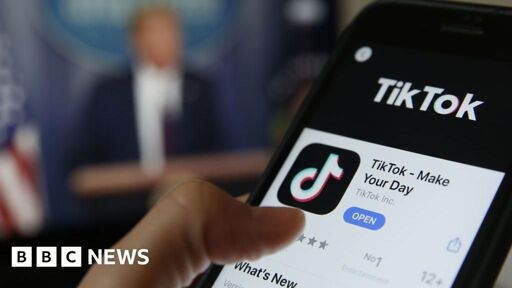- cross-posted to:
- world@lemmy.world
- cross-posted to:
- world@lemmy.world
“There are big parallels between TikTok and what happened with China’s Huawei and Russia’s Kaspersky that indicates it’s just a matter of time until a creeping ban takes affect,” says Emily Taylor, Editor of the Cyber Policy Journal.
In both cases these companies were accused by the US of being a threat to national security - but no smoking gun was ever revealed by cyber security authorities.
The same has happened with TikTok.
Under President Trump, Kaspersky’s flagship antivirus software product was banned from civil and military computers in the US after accusations arose in 2017 that it was used by the Kremlin in a hacking incident that was never proven.
The UK followed almost immediately and one by one other allies fell into line with restrictions, warnings or bans.
It took years but eventually a countrywide ban took effect last year in the US but it was all but redundant by then. Kaspersky closed its US operations followed by its UK offices saying there is no viable business there.
…
Almost the exact same thing happened with Chinese telecoms giant Huawei.
The US accused Huawei and other Chinese tech firms of being too close to the Chinese government. It argued that the company’s popular 5G kit should not be used to build telecoms in case it could be used to spy on or degrade communications.
A former Huawei UK member of staff said that once the US decided to ban, block or restrict Huawei it became almost inevitable that allies would follow.
“The UK and others spoke about independently coming to their own conclusions over security but the US was unrelenting in its lobbying behind closed doors. They warned about the national security risks which were never backed up by evidence,” said the former insider, who didn’t want to be named.
Intense US lobbying of allies on security issues is something often seen in many aspects of cyber policy.
…
Ciaran Martin, who was head of the UK’s National Cyber Security Centre during the bans on Huawei and Kaspersky, agrees that generally when the US makes a national security or strategic decision about a company, the UK and allies eventually follow suit.
…
At the moment, there are “no plans” for a TikTok ban in the UK, a government spokesperson said on Saturday. “We engage with all major social media companies to understand their plans for ensuring the security of UK data and to ensure they meet the high data protection and cyber security standards we expect.”
Meanwhile, UK government minister Darren Jones told the BBC on Sunday: “We won’t be following the same path as the Americans unless or until… there is a threat that we are concerned about in the British interest, and then of course we will keep it under review.”
The app was banned from the UK Parliament in 2023 over security concerns.
But Jones, the chief secretary to the Treasury, told Sunday with Laura Kuenssberg that “for consumers who want to post videos of their cats dancing, that doesn’t seem like a security threat to me”.
I’m not sure it follows that TikTok ban would spread unless the US puts pressure on other countries.
The US did put pressure on its allies over Huawei and Kaspersky, and the Five Eyes countries work very closely together already. There were also genuine security concerns (rightly or wrongly) around the potential of both Huawei and Kaspersky acting as Trojan horses within critical telecoms infrastructure.
The TikTok ban is more political and a round the idea of it harvesting user data (which US companies already do to allies) and influence how people think (which us companies also do).
Banning such apps in the big commonwealth and European countries would be much more controversial and toxic than Huawei and Kaspersky was. The US is not the only country with freedom of speech concerns and protections, and at the moment the big focus is actually all social media companies and their failures to remove illegal content, prevent abusive behaviour and failure to prevent the spread of lies. Meta is the primary target in many countries, as it probably should be in the US.
Regulation of data has been tgebbig focus and all the big social media companies, including TikTok, are required to hold EU citizen data in the EU. Failure to comply with those laws is the potential route to TikTok and other companies being fined and even eventually banned if the laws change further.
One big difference is the US is one of the few countries that doesn’t have a strong data privacy tradition. As a result you get ad-hoc bans on individual companies rather than holding all companies liable for mismanagement of user data. How does TikTok satisfy the UK data protection people that user data is correctly managed.
Apparently Trump is popular on TikTok, so I expect this decision to be reversed soon.



